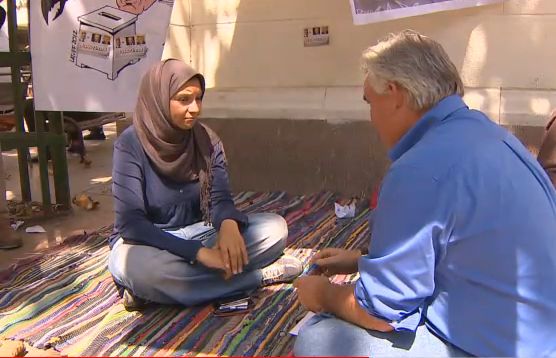![]()
RubinReports | By Barry Rubin
It is impossible for the moment to say what’s going to happen in Egypt. But there are two basic scenarios:
— The armed forces, which have declared martial law, will continue to control the real power and will use the Muslim Brotherhood leader who has become president, Muhammad al-Mursi, as a figurehead. Evidence for this includes the fact that the military is the current source for legislation in Egypt and controls foreign policy.
— The armed forces will impose a sweet deal on al-Mursi, letting him do pretty much what he wants as long as he doesn’t touch the military’s economic wealth and the army as an institution. The armed forces will determine who becomes defense minister and will set their own budget. Perhaps the generals will also insist al-Mursi doesn’t go too far in threatening Israel or antagonizing the United States (placing U.S. aid to the military in jeopardy).
Events could go either way, and it might take a while to see what’s happening since presumably it will take at least six months to elect a new parliament and another six months to write a constitution. In addition, the precise arrangements will be very important. Is the military only saying “hands-off” towards its economic empire and autonomy, or does it seek far more power? Will it effectively restrain the Muslim Brotherhood from possibly provoking war with Israel?
The other political forces in the country are more openly tipping their hands. The radical Salafists will try to outflank the Brotherhood in militancy, but are likely to cooperate with it on lots of things. Many of the moderate “liberals” are also supporting the Brotherhood.
The radical Salafists will try to prove their militancy compared to the Brotherhood, allowing the Brotherhood — along with Western media and governments — to portray the Brotherhood as moderate. For example, the al-Nour party says it would ban the sale of alcohol, both to Egyptians and tourists, and would ban the resorts that cater to Westerners. Almost certainly, al-Mursi will oppose doing anything to hurt Egypt’s tourism industry. He would do it for financial reasons; the West would interpret this as him being a pragmatist.
There are other things that might go unnoticed, yet which are far more important. Will al-Mursi interfere in Egypt’s official religious hierarchy by trying to replace the two highest officials (the qadi and the head of al-Azhar University)? While the relative moderation of establishment figures is often hypocritical and inconsistent, it would nevertheless play some role in limiting the Brotherhood’s extremism.
Another such situation: economic issues. Al-Mursi’s spokesman says he will put the emphasis on making Egypt into a strong economy. Since this is impossible, al-Mursi is more likely to follow a populist approach: big promises, phony jobs, strong subsidies to keep consumer goods cheap. All of that spells more debt. And foreigners will be asked to pay the bills.
Lenin once reportedly said that he would get the capitalists to sell him the rope with which to hang them. But Egypt is a far clearer case of such a situation. Will the dhimmis finance the consolidation of the Muslim Brotherhood’s power in Egypt? It sure looks like that will happen, though they probably will be cheap about it.
Never forget that since any economic program in Egypt is doomed to fail, the ultimate outcome will probably be a government having to decide between repression at home, hysterical hatred and foreign adventures abroad, or both.
Moreover, Egypt is already throwing away hundreds of millions of dollars from natural gas sales to Israel. Indeed, five former high-ranking officials have been sentenced to imprisonment of between three and fifteen years for signing a deal to discount the prices to Egypt. They were also fined $2.3 billion — which of course they don’t have — an amount that is triple the alleged losses to Egypt caused by the discounting.
There is plenty of corruption in Egypt, but they are not being accused of pocketing the money — rather, they are accused of negotiating a contract whose terms were dictated by market conditions. Will this discourage Westerners from making business deals that might also turn into alleged criminal acts when political conditions require that? Shafiq also has left the country ahead of corruption charges. He might well have been corrupt. But remember, corruption charges can be used by the Brotherhood to destroy the opposition systematically (coupled with charges of being Zionist and American stooges, bad Muslims, or not Muslims at all).
Al-Mursi also called — in a victory speech notable by its expressed wish to get along with everyone — for the freeing of Omar Abd al-Rahman, the mastermind of the first World Trade Center attack currently being held in a U.S. prison. Abd al-Rahman historically was associated with the Salafists, not the Brotherhood. Still, Americans are likely to miss the intimation that the first attack on the World Trade Center was a good thing, whatever one thinks of the second aerial assault.
As for the reformers, forget it. The alleged Facebook kids are turning into Brotherhood satellites, supporting al-Mursi and campaigning against the army limiting his power in any way. In Tahrir Square, some of those demonstrating against the military explained that they expect the Brotherhood will reward them for their support.
And in what should be a very important lesson and a huge media story, a Brotherhood leader has spilled the beans about Wael Ghonim. The Google executive was portrayed as the very model of a moderate liberal Egyptian during the “revolution.” Ghonim publicly announced that he voted for al-Mursi in the presidential election.
Now, veteran Egypt-watcher Raymond Stock points out that Essam el-Erian said Ghonim has been a Brotherhood member for a while. Equally significant, el-Erian added that Abdel-Rahman Mansour is still a Brotherhood member. As Stock explains:
These are reputedly the two most important figures behind the famous social media side of the revolt.
The Brotherhood has frequently praised both men, though it has made clear they should not be given any real authority or influence. Stock added:
This information completely destroys the fiction that there is a clear separation between the “secular-liberal youth” cadre and the Islamists. Essentially, El-Erian is bragging none too subtly that the Muslim Brotherhood played a key role in launching the uprising.
They did, however, leave the initial leadership and planning to others for the first few days.

Asma Mahfouz interviewed by the CNN reporter in front of a poster with a scorpion on it. The head is that of Ahmad Shafiq, the presidential candidate who opposed al-Mursi. Overthrown President Hosni Mubarak is the stinger. An Israeli Star of David is imposed on both to present them as the puppet of the evil Zionists. (Image grab from CNN)
Meanwhile, the third leading “secular” activist who led the revolution, Asma Mahfouz — who always wears a burqa — often sounds like an Islamist as well. In her latest interview — though the reporter and viewers are given no hint of this — she is standing in front of a poster that has a scorpion on it. The head is that of Ahmad Shafiq, the presidential candidate who opposed al-Mursi. Overthrown President Hosni Mubarak is the stinger. An Israeli Star of David is imposed on Shafiq to present him as the puppet of the evil Zionists.
There are certainly dissenters, truly anti-Islamist, anti-totalitarian liberals, but they have little power. The Wafd Party, largest of the non-Islamist groups, is directionless and often ready to sell out. The democratic liberal Free Egyptians’ Party is limited by the fact that it draws most of its backing from the Christian minority.
Given all of this, one can understand the fear of Tariq al-Homayed, a courageous liberal and editor of London-based, Saudi-owned newspaper al-Sharq al-Awsat, who writes (MEMRI translation):
Anyone who feels optimistic… and thinks we are watching a movie that is sure to have a happy ending, is mistaken. … Some might claim that the military will be Egypt’s guarantee, along with the country’s strong judiciary. This is true, but we must remember that Egypt’s president is now from the Muslim Brotherhood; in other words, the Muslim Brotherhood is ruling the country.
Anyone who says that the Muslim Brotherhood is the reality, so we must deal with it and not criticize it, and other such talk, is mistaken [Note: A probable reference to U.S. policy — BR]. … It is always permissible [to criticize them]. … The current political coup by the Islamists is no less dangerous than a military coup.
While in theory waiting and insisting that the Brotherhood prove to be moderate, in effect Western policy has already concluded that the Brotherhood is okay and prefers it to the Egyptian military. That also tilts the scales toward Brotherhood rule. And the Brotherhood also has enthusiastic support from the al-Jazeera network.



 RSS
RSS











Latest Comments
Hello Mike, Thank you for your positive feedback to the article. I felt there wasn’t too much critical analysis of ...
Thanks for this considered and well constructed article. A follow up article on the manner in which the editorial contro...
THE CLUELESSNESS OF CLAIMING THAT OBAMA'S MIDDLE EAST POLICIES WERE A FAILURE CANNOT BE FURTHER FROM THE TRUTH, WHAT THE...
As long as Obama is the president of the usa do not trust the us government......
Thank you for an good read....